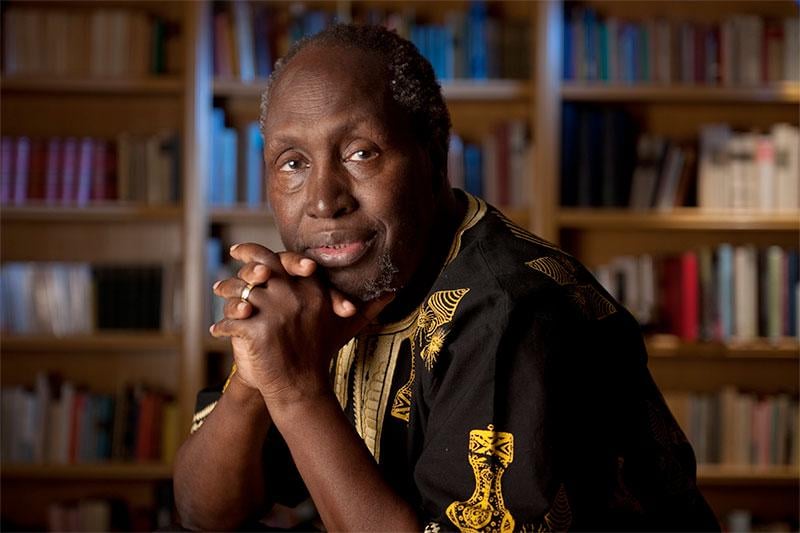Ngugi wa Thiong’o, born James Ngugi on January 5, 1938, was a literary giant hailing from Kenya, known for his profound impact on African literature. His legacy extends far beyond his passing at the age of 87, leaving behind a rich tapestry of works that delve deep into themes of colonialism, postcolonialism, and the African experience. Let’s embark on a journey through the life, works, and influence of this revered figure.
Ngugi’s roots trace back to Kamiriithu, Kenya, where he was raised in a vibrant and expansive family setting. His educational journey took him through mission-run schools before he pursued higher studies at Makerere University College in Uganda and the University of Leeds in England. It was during this period of academic pursuit that he made a significant decision, shedding his birth name James Ngugi in favor of Ngugi wa Thiong’o, a symbolic act of resistance against colonial influences in favor of embracing a more authentic Kenyan identity.
In the realm of literature, Ngugi burst onto the scene with the performance of his play “The Black Hermit” in 1962, captivating audiences with his poignant storytelling. Subsequent works such as “Weep Not, Child” (1964) and “The River Between” (1965) solidified his reputation as a literary force to be reckoned with. Through his writings, Ngugi delved into the complexities of colonialism, the tumultuous era of the Mau Mau Uprising, and the arduous quest for independence in Kenya.
Ngugi’s literary arsenal was not confined to novels and plays; he also penned insightful essays that shed light on the challenges faced by Kenyans post-independence, advocating strongly for the decolonization of African societies.
An essential aspect of Ngugi’s literary philosophy was his emphasis on the preservation and elevation of African languages in the realm of literature. By choosing to write his works in his native Kikuyu language, he championed the importance of linguistic diversity and cultural authenticity in storytelling, a stance that resonated deeply with both local and international audiences.
However, Ngugi’s impact transcended the realms of literature; he was also a fervent political activist whose outspoken views led to his imprisonment in Kenya. Undeterred by adversity, he sought refuge in exile first in England and then in the United States, where he continued to amplify his voice as a staunch critic of colonialism and a staunch advocate for African self-determination. As a professor of literature, Ngugi inspired countless students with his wisdom and unwavering commitment to social justice.
Ngugi’s literary repertoire boasts a formidable array of works, including notable titles like “Weep Not, Child” (1964), “The River Between” (1965), “A Grain of Wheat” (1967), and “Devil on the Cross” (1982), each a testament to his narrative prowess and intellectual depth.
Among his most celebrated works is “Decolonizing the Mind: The Politics of Language in African Literature” (1986), a seminal piece that continues to provoke discourse on the intersections of language, culture, and power in the African context. His magnum opus, “Wizard of the Crow” (2006), stands as a towering achievement in African literature, showcasing his unparalleled storytelling acumen and unyielding commitment to societal transformation.
In a remarkable feat of literary achievement, Ngugi’s short story “The Upright Revolution: Or Why Humans Walk Upright” (2019) has transcended linguistic boundaries, being translated into over 100 languages and earning the distinction of being the most translated short story in the annals of African writing. This global resonance underscores the universal appeal and enduring relevance of Ngugi’s narratives, which continue to captivate diverse audiences worldwide.
As news of Ngugi wa Thiong’o’s passing reverberates across the literary landscape, tributes pour in from admirers, scholars, and fellow writers alike, honoring his indelible legacy and profound contributions to African letters. Through his pen, Ngugi breathed life into narratives that spoke truth to power, challenged oppressive systems, and celebrated the resilience of the human spirit in the face of adversity.
Ngugi wa Thiong’o’s enduring legacy serves as a beacon of inspiration for generations of writers, activists, and thinkers, reminding us of the transformative power of literature to ignite change, foster empathy, and illuminate the path towards a more just and equitable world.
In commemorating Ngugi’s life and work, we pay homage to a literary luminary whose words transcended borders, bridged cultures, and reshaped our collective consciousness. As we reflect on his profound influence and lasting imprint on the literary landscape, we are reminded that the spirit of Ngugi wa Thiong’o lives on in the pages of his works, inspiring us to envision a future imbued with hope, justice, and the enduring power of storytelling.

